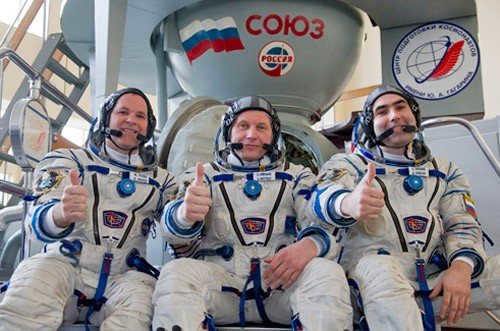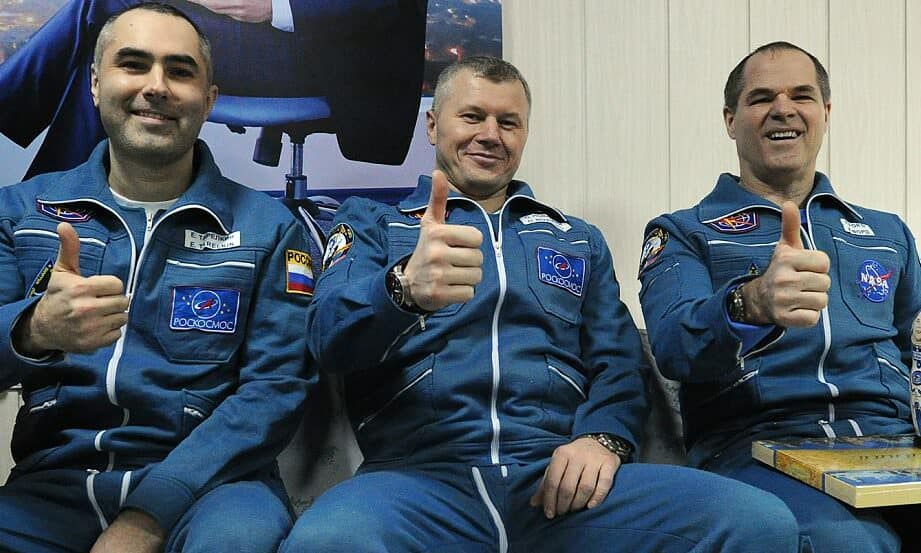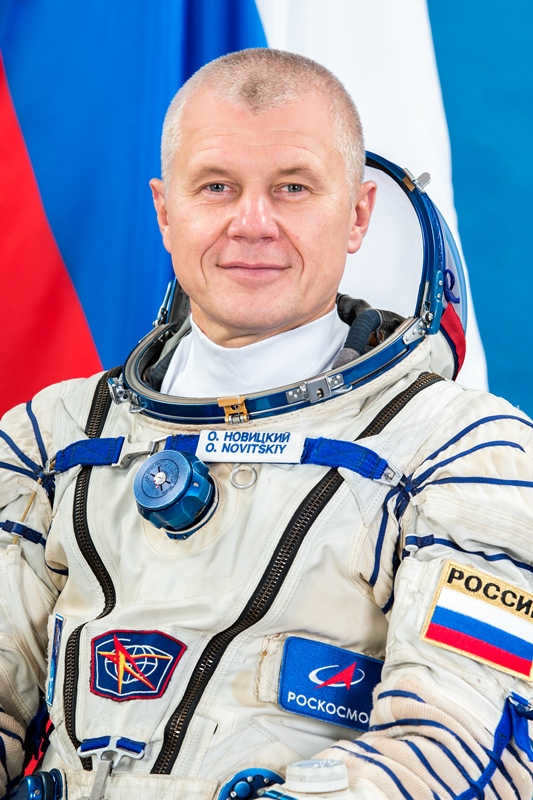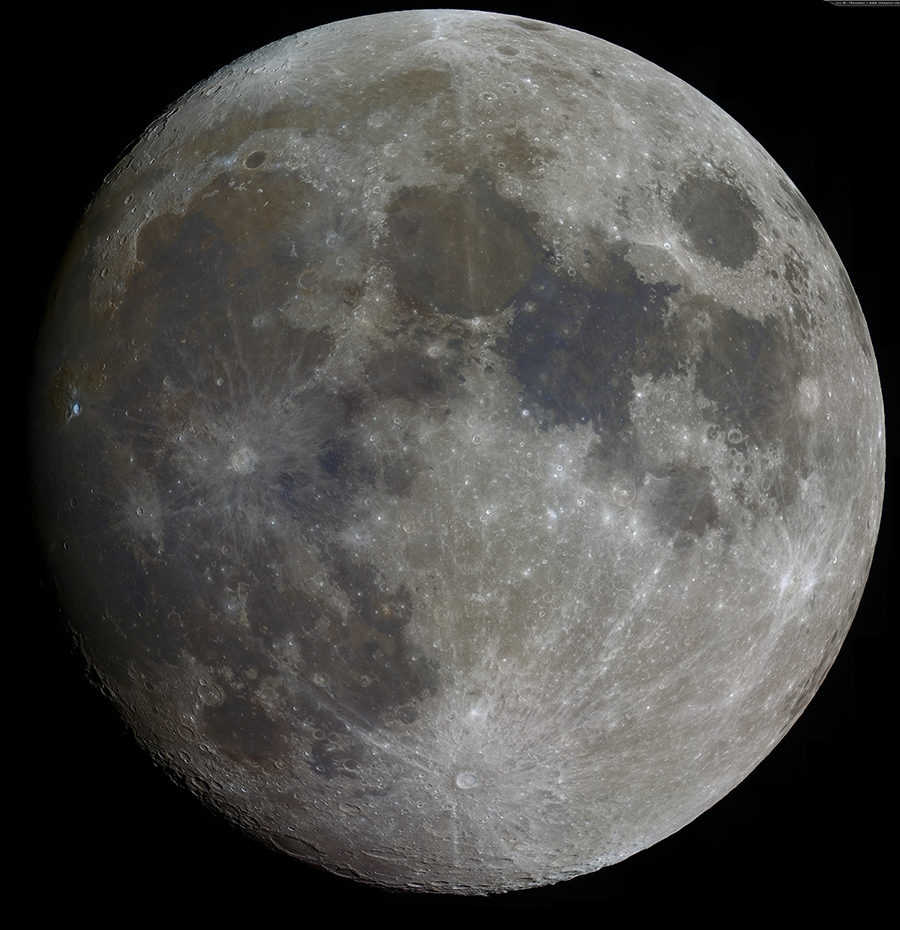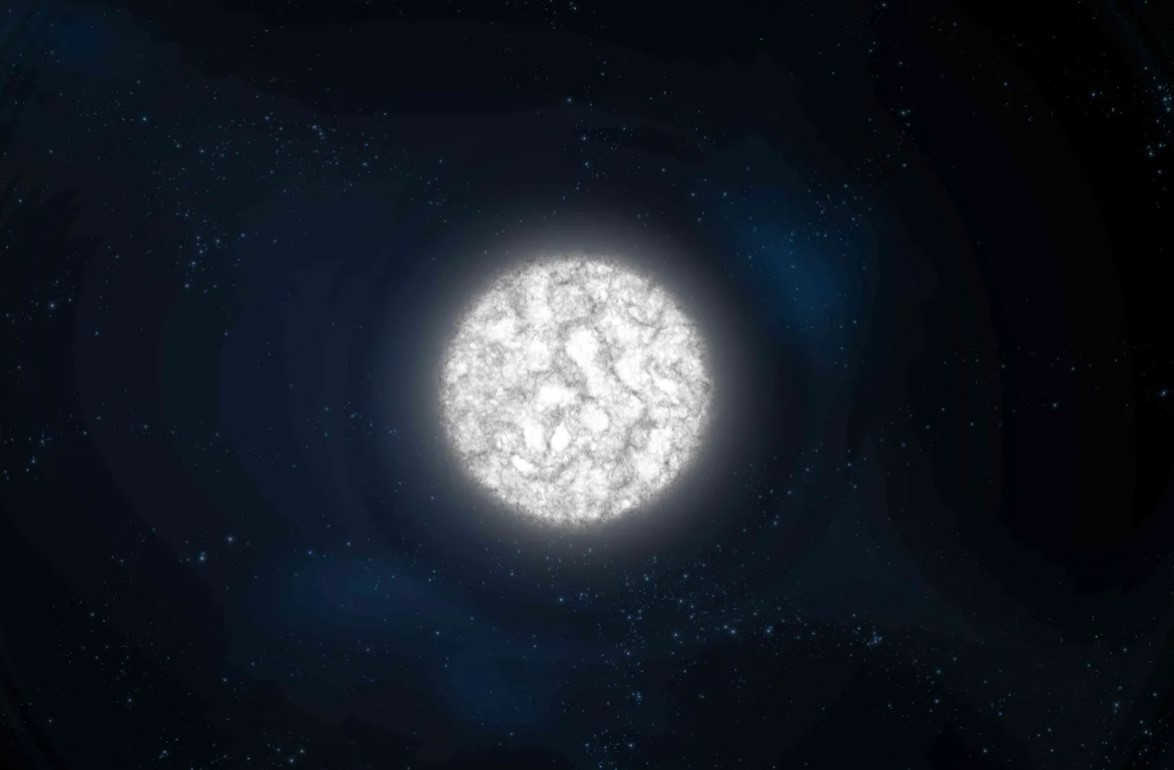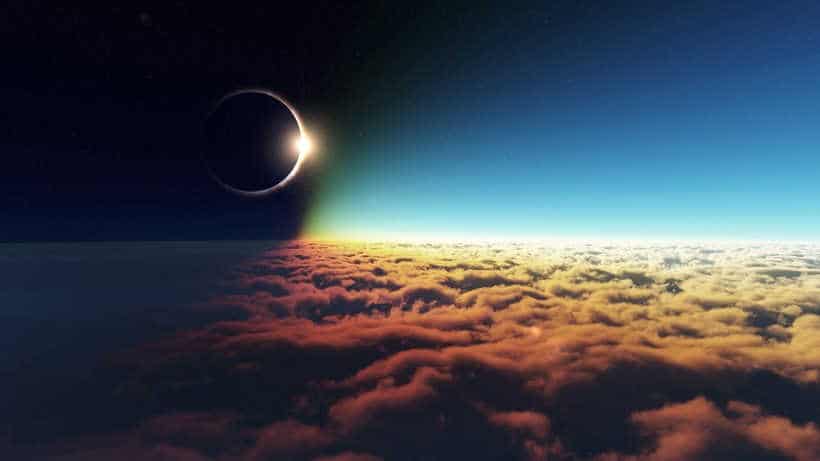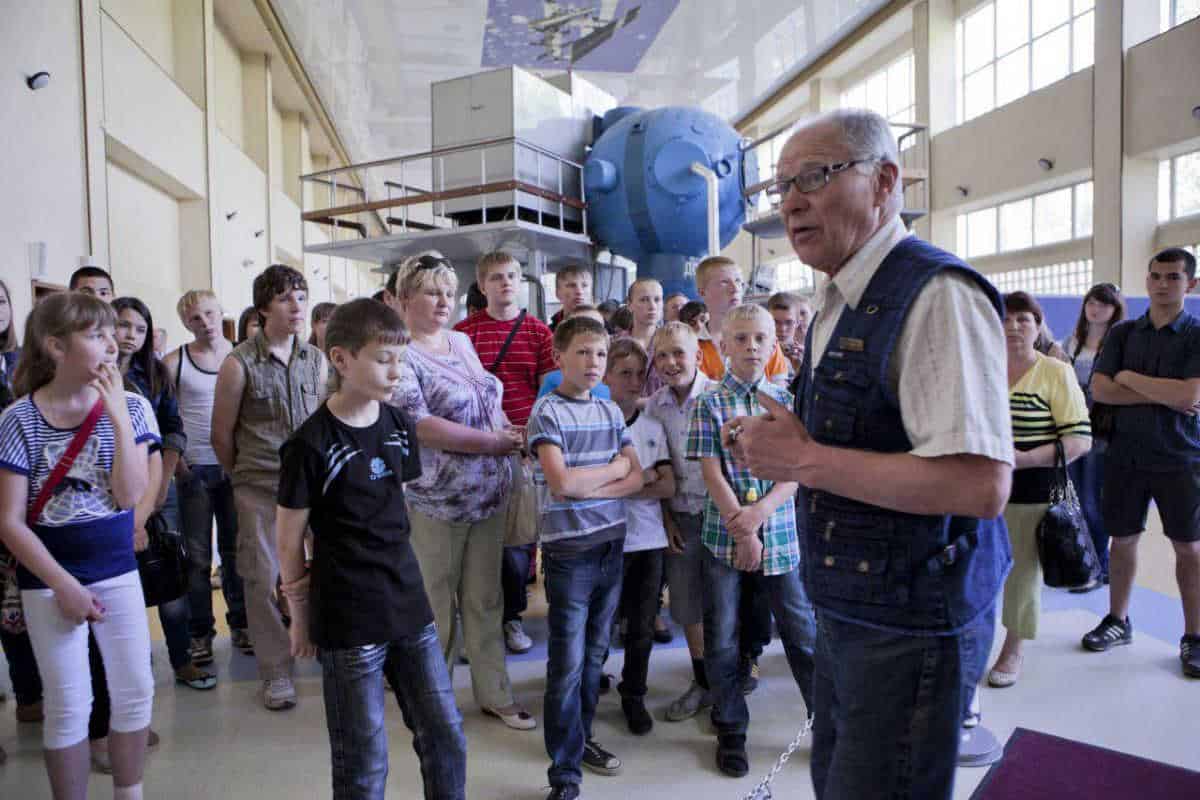Oleg Novitsky, a pilot-cosmonaut of the Russian Federation, holds the esteemed title of Hero of the Russian Federation.
SEQUENCE NUMBER: 114/526
NUMBER OF MISSIONS: 3
MISSION DURATION: 531 days 6 hours 58 minutes
SPACEWALKS: 3
TOTAL SPACEWALK DURATION: 22 hours and 33 minutes
DATE AND PLACE OF BIRTH:
Oleg Novickij was born on October 12, 1971, in Cherven, Minsk Oblast, Belorussian SSR.
EDUCATION:
In 1988, I completed my secondary education at Cherven Secondary School No. 2 and enrolled in Borisoglebsk Higher Military Aviation School of Pilots, which is named after V.P. Chkalov. However, due to the disbanding of the BVVAUL, I had to continue my studies at Yeysk Higher Military Aviation School of Pilots, named after V.M. Komarov, from 1990 to 1993. Later, I was transferred to Kachinsk Higher Military Aviation School of Pilots, named after A.F. Myasnikov, as EVVAUL was being re-formed. In 1994, I successfully graduated from Kachinsk Higher Military Aviation School of Pilots with a specialization in “Command Tactical Fighter Aviation” and obtained the qualification of “pilot-engineer”.
In 2006, I completed my education at Yuri Gagarin Air Force Academy, where I earned a degree in Management of Military Units and Compounds (Air Force) with the qualification of Management Specialist.
In 2015, I graduated with honors from the Russian Presidential Academy of National Economy and Public Administration, earning a Master’s degree in State and Municipal Management.
ACTIVITIES PRIOR TO ENROLLMENT IN THE COSMONAUT SQUADRON:
From October 1994 to September 1995, I underwent retraining at the Borisoglebsk CP of PLS.
From September 1995 to December 1995, I served as a pilot of the Instructor Fighter Aviation Regiment of the V.P. Chkalov Training Center.
From May 1996 to June 2004, I served in various positions within the Attack Aviation Regiment (AAR) of the 1st Guards Mixed Aviation Division (MAD) of the 4th Air Force and Air Defense Army of the North Caucasus Military District, including pilot, senior pilot, squadron commander, and deputy squadron commander.
Upon completing his studies at the Academy, he took on the role of squadron commander for the SHAP of the 1st Guards Mixed Aviation Division (SAD) of the 4th Air Force and Air Defense Army of the North Caucasus Military District from June 2006 to February 2007.
Prior to joining the cosmonaut squadron, he acquired expertise in flying L-39 and Su-25 aircraft. He has accumulated approximately 700 hours of flight time and holds the rank of a 2nd class military pilot. Additionally, he possesses qualifications as a “diving officer” and an “instructor of parachute and airborne training”.
DATE OF JOINING THE DETACHMENT (RECRUITMENT NO., DATE):
Recruitment 14 (February 7, 2007);
From February 2007 to July 2009, he underwent comprehensive space training at the Y.A. Gagarin Space Center, successfully completing it after passing state examinations with an “excellent” grade.
On August 1, 2009, he was granted the designation of “test cosmonaut” by the Interdepartmental Qualification Commission.
He is a cosmonaut of the 2nd class, a parachutist-instructor, and a diving officer.
PREPARATION FOR SPACE FLIGHTS:
From August 2009 to March 2010, he underwent training as a member of the ISS program specialization group;
Between March 2010 and May 2012, he received training as a member of the backup crew for ISS-31/32, serving as a spacecraft commander and ISS flight engineer;
From May to October 2012, he trained as a member of the main crew for ISS-33/34, serving as a spacecraft commander and ISS flight engineer;
Between December 2014 and July 2016, he underwent training as part of the backup crew for ISS-48/49, serving as the commander of the Soyuz MS-02 TPC and ISS-48/49 flight engineer;
From July 2016, he trained as a member of the main crew for ISS-50/51, serving as the commander of Soyuz MS-03 and flight engineer of ISS-50/51.
EXPERIENCE OF SPACEFLIGHT:
From October 23, 2012 to March 16, 2013, I served as the commander of the Soyuz TMA-06M TPC and flight engineer of ISS-33/34, alongside E.I. Tarelkin and NASA astronaut Kevin Ford. Our mission lasted a total of 143 days, 16 hours, and 14 minutes. My callsign during the flight was “Kazbek”. Throughout the mission, I actively participated in various activities, including working with four Russian cargo ships from the Progress series, conducting scientific research, and performing applied experiments.
From November 17, 2016 to June 2, 2017, Oleg Novitsky served as the commander of the Soyuz MS-03 TPC and ISS-50/51 flight engineer. He worked alongside ESA astronaut Tom Pesquet and NASA astronaut Peggy Whitson. The duration of their flight was 196 days, 17 hours, and 50 minutes. During this time, Novitsky conducted various scientific experiments and research, ensured the functionality of the ISS, and helped with the installation of new equipment brought by cargo ships. On June 2, Novitsky and Pesquet safely returned to Earth in the descent vehicle of the Soyuz MS-03 manned transport spacecraft.
April 9, 2021 – October 17, 2021. Assumed command of the Soyuz MS-18 spacecraft alongside Peter Dubrov and Mark VandeHay. After three and a half hours, successfully docked the spacecraft with the International Space Station. Throughout the mission, the crew conducted three spacewalks, completing a significant amount of tasks. In October, the Soyuz MS-18, carrying Oleg Novitsky, Klim Shipenko, and Yulia Peresild, disengaged from the International Space Station and safely landed in Kazakhstan.
Awarded the prestigious title of Hero of the Russian Federation, accompanied by the Gold Star medal,
earned the honorary designation of “Pilot-Cosmonaut of the Russian Federation” in 2014;
Received Medals from the Ministry of Defense of the Russian Federation for “Participation in Combat Operations,”
“Military Valor” of the second degree,
and “Distinguished Military Service” of the first, second, and third degrees.
“In recognition of service in the Air Force.”
St. Sergius of Radonezh Badge
Presented with a watch “For Personal Bravery”.
Holds the designation of “Veteran of combat operations”.
MARITAL STATUS:
CURRENT STATUS:
Second-class instructor-cosmonaut-test pilot of the Roscosmos cosmonaut squadron.
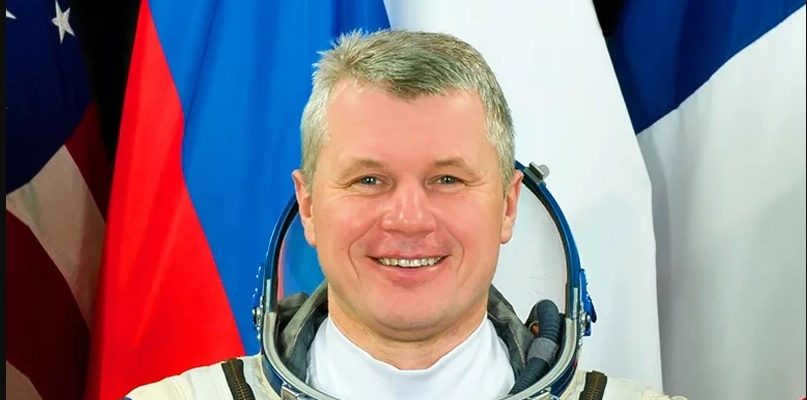
Cosmonaut Oleg Novitsky, who has spent a number of years in Earth’s orbit, has had multiple missions to outer space and has visited various international space stations. In recognition of his accomplishments, he has been awarded prestigious state honors. His name will always be remembered in the annals of Russian and global space exploration.
Biography
Oleg Novitsky was born in the town of Cherven, Minsk region, on October 12, 1971. He comes from a typical working-class family and has two brothers and a sister. Since he was a child, Oleg has always admired the renowned Soviet astronaut, Yuri Gagarin, and has been fascinated by space exploration.
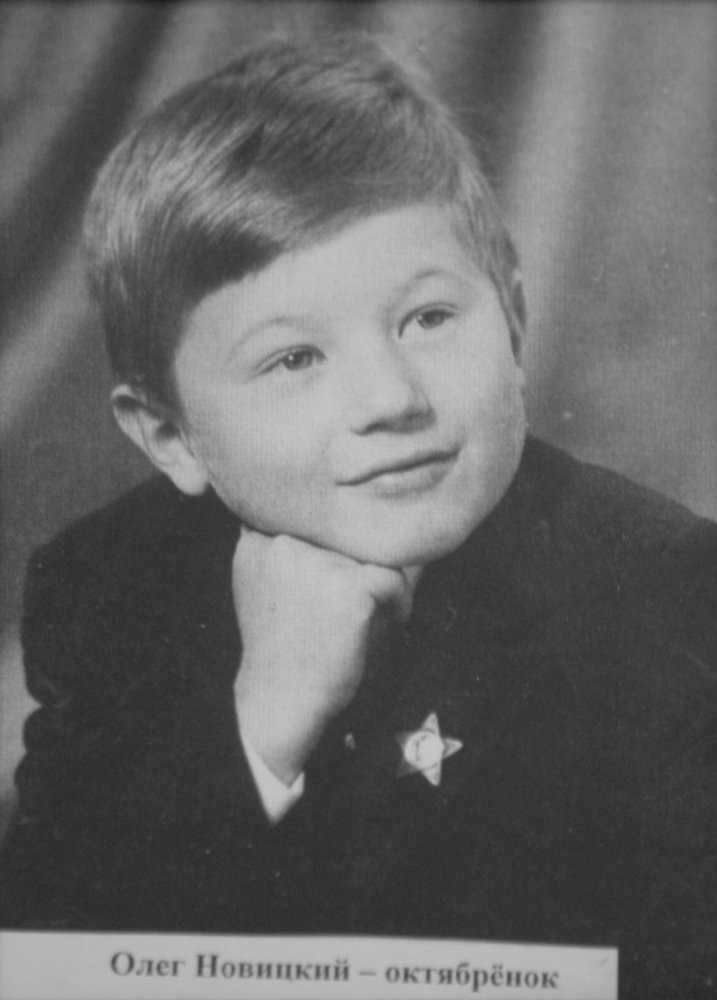
The young man had a keen interest in stars, spacecraft, and everything related to space exploration. During high school, Novitsky made a firm decision that his future would be intertwined with aviation.
After receiving his high school diploma, Oleg enrolled in the Borisoglebsk Higher Aviation School. As a student, the aspiring astronaut was occasionally transferred to other educational institutions. As a result, he obtained a degree as a pilot-engineer.
The sky alone wasn’t enough for Oleg. He yearned to go even higher and witness the Earth’s magnificence with his own eyes. To fulfill this dream, the pilot continued his education. In 2004, he became a student at the Gagarin Air Force Academy. Two years later, he successfully completed the command program.
Pilot’s Career
Oleg Novitsky dedicated around a decade to serving in the North Caucasus Military District. He held the position of a deputy commander in an aviation squadron. Throughout his career, the experienced pilot accumulated over 600 hours of flight time. His proficiency was put to the test while testing L-39 and Su-25 aircraft.
Novitsky actively participated in the Chechen war, earning the prestigious title of “Veteran of combat operations” for his contributions. In 2012, Oleg transitioned to the reserve, assuming the rank of colonel.
Space Exploration
In 2012, Oleg Novitsky embarked on his inaugural space mission, a culmination of years of preparation. The astronaut underwent rigorous psychological and intellectual evaluations, as well as extensive training on simulators and comprehensive medical examinations. Prior to his space voyage, Novitsky served as part of the auxiliary crew, gaining valuable experience and knowledge.
In 2012, Novitsky journeyed to the cosmos aboard the Soyuz TMA-04 spacecraft, accompanied by a fellow countryman and an American specialist. He spent an impressive 143 days in orbit, conducting various scientific experiments and contributing to the advancement of space exploration. In 2016, Novitsky returned to the International Space Station as the ship’s captain, completing a 196-day mission before landing back on Earth in the summer of 2017.
In April 2021, he completed his third flight. Novitsky assumed the role of commander on the Soyuz MS-18 spacecraft while also serving as a flight engineer. Throughout his career, he has ventured into outer space on three occasions to carry out module maintenance tasks.
In October, Novitsky and his crew were relieved by a new team consisting of actors. Over the course of several days, these Russian movie stars had the unique opportunity to experience life in space as they worked on a film project. The astronauts provided assistance to the artists in adapting to the conditions aboard the orbital station. On October 17, the shuttle crew successfully returned to Earth.
Oleg Novitsky at present
At present, Oleg Novitsky is currently engaged in preparations for upcoming space missions. He frequently receives invitations to participate in interviews, during which he is often questioned about his experiences living in the vacuum of space and dealing with weightlessness. Oleg responds to these inquiries with his signature sense of humor and a warm smile.
Ever since he was a child, Oleg Novitsky has harbored dreams of exploring the vastness of the universe. As the 114th Russian citizen to visit the International Space Station (ISS), he has made significant strides towards achieving his lifelong aspiration. Along the way, Oleg has acquired various qualifications, including those of a flight engineer, parachute and parachute training instructor, diving officer, and test cosmonaut. Currently, he holds the esteemed position of being a full member of the Yuri Gagarin Scientific Research Institute of the Central Cosmonautical Space Center and serves as a commander of passenger and transport spacecraft.
Childhood and Adolescence
Oleg Viktorovich Novitsky was born in the autumn of 1971 in the city of Chervene, Minsk region, under the astrological sign of Libra. Growing up in a typical Soviet family in the Belarusian SSR, Oleg and his siblings – a sister and two brothers – were provided with everything they needed by their well-educated and intelligent parents. Throughout his childhood, Oleg was nurtured and cared for by his loving mother and father.
From a tender age, Oleg developed a keen interest in all things related to aviation and astronautics. He aspired to emulate the great Yuri Gagarin, who became the first human to journey into outer space.
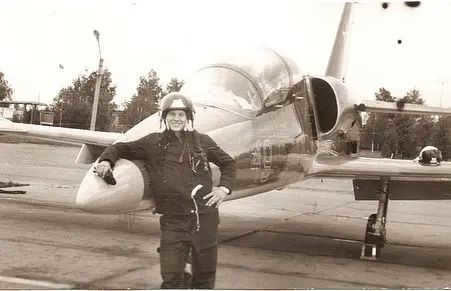
In interviews, the astronaut expressed his admiration for his teachers and classmates. Joining the team at the Research Institute of the Central Cosmonautical Cosmonaut Training Center named after Yuri Gagarin, he made regular visits to his old school. The people of Cherveni, both young and old, eagerly attended meetings with their heroic compatriot. Novitsky always enjoyed engaging with those who showed an interest in his experiences.
Oleg shared with the audience that his dream of going to space motivated him to pursue specialized education at the V. P. Chkalov Higher Military Aviation School, located in the Voronezh region. Due to various faculty and department reorganizations, the Belarusian native ended up studying in Volgograd and Yeisk.
Service in the Air Force
During the mid-1990s, Novitsky, a 180 cm tall individual with a slender build, underwent retraining at the Borisoglebsk Aviation Center and became a member of the instructor fighter regiment within the Chkalov Central Fighter Regiment. As a private and senior pilot, Novitsky gained valuable practical experience. This experience proved to be advantageous during his time in the North Caucasus Military District, where he served as a squadron commander and later as the deputy commander of an attack air squadron.
In the mid-2000s, Oleg joined the Yuri Gagarin Air Force Academy to acquire further theoretical knowledge. After completing the command faculty and obtaining a manager qualification, the pilot-engineer assumed leadership of one of the military formations in the Russian Air Force. Oleg underwent training in operating the Su-25 armored attack aircraft and the L-39 combat aircraft, and later took part in the military campaign in Chechnya.
Cosmonautics
In the winter of 2007, Oleg Viktorovich Novitsky underwent a medical examination at the Institute of the Russian Academy of Sciences and participated in several interviews, which led to his acceptance into the esteemed group of space explorers. Following this, Novitsky successfully completed the mandatory training course at the renowned research institute named after Yuri Gagarin and successfully passed the state exams. In the late summer of 2009, a special commission awarded Novitsky, a skilled pilot, with the prestigious qualification of “test cosmonaut”. In 2010, he was further recognized for his accomplishments and received the rank of colonel. However, two years later, Oleg Viktorovich made the decision to resign from his military service and transition into the reserves.
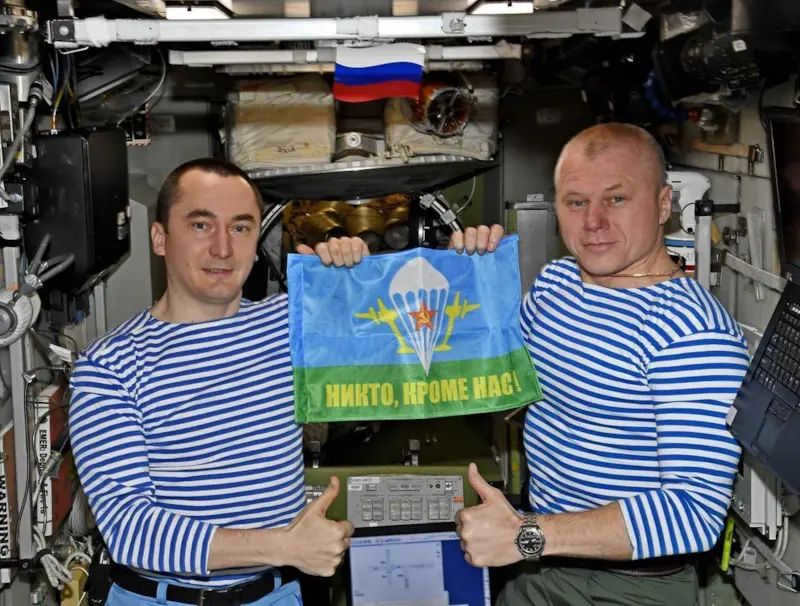
After leaving the Air Force, my life took a different direction. I was constantly involved in various training programs, undergoing intellectual and psychological tests in order to qualify as an active member of the squadron and a flight engineer for the International Space Station. Finally, in 2012, I achieved my goal and was selected to join the main crew of the orbital station. This marked my debut flight to the ISS, where I served as the commander of the Soyuz TMA-06M manned passenger transport spacecraft.
During my more than two-month stay at the ISS, myself and my colleagues, including Sunita Williams, Yuri Malenchenko, Akihiko Hoshide, Kevin Ford, and Evgeny Tarelkin, followed a program approved by Roscosmos. The international team of astronauts carried out spacewalks, while the Russian crew members received supplies from the Progress M-17M and SpaceX CRS-1 cargo craft.
After returning to the Earth, the Belarusian native made sure to maintain his fitness. In the latter half of the 2010s, he successfully showcased his abilities during the routine preflight examinations, earning him a spot in the 48th/49th crew rotation on the manned space station. Later on, he was chosen, along with American biochemist Peggy Winston and French astronaut Thomas Pesquet, to form the core team for the 50/51st expedition to the International Space Station (ISS), where they spent a total of 162 days, 7 hours, and 23 minutes in orbit.
In April 2021, Novitsky embarked on his third journey to the ISS alongside Peter Dubrov and Mark Vande Hai. This time, their stay in Earth’s orbit surpassed previous personal records. A total of 191 days were dedicated to the disassembly, installation, assembly, and adjustment of new equipment, as well as the gradual integration of the multifunctional external module “Nauka” into the Russian segment of the station.
The mission also involved participation in the production of the film “Challenge”. The commander of the Soyuz MS-19 spacecraft, Anton Shkaplerov, was tasked with transporting the director of this unprecedented cinematic project, Klim Shipenko, and the winner of the contest organized by Roscosmos and Channel One, actress Yulia Peresild.
Personal life
Oleg Novitsky was married to Julia. They had two daughters together. Their first daughter, Yana, was born in 1996. There is a 20-year age difference between Yana and their younger daughter, Margarita.
Currently, Novitsky is no longer married. He prefers to keep his personal life private and does not comment on any changes.
Oleg Novitsky at present
In April 2023, The Challenge premiered and Novitsky joined the cast. He has given several interviews about his interesting experience on the show. Novitsky emphasized that the project demonstrated the possibility of preparing any individual for a space flight in a short period of time. Despite not having a background in acting, the Belarusian cosmonaut made an effort to appear natural on screen.
When it comes to his career plans, Oleg had no intention of retiring as an active cosmonaut. He had at least one more flight to the ISS scheduled for 2024 or 2025.
Achievements
- 2014 – Received the prestigious title of “Hero of the Russian Federation”
- 2014 – Earned the distinguished title of “Pilot-Cosmonaut of the Russian Federation”
- 2018 – Awarded the Order “For Merit to the Fatherland” IV degree
- 2018 – Honored with the title of “Honorary Citizen of Budyonnovsk”
- 2019 – Knighted with the Chevalier of the Legion of Honor by France
- 2021 – Received the Badge of St. Sergius of Radonezh
- Awarded the Medal “For Military Valor” II degree
- Received Medals “For Distinction in Military Service” I, II, III degree
- Awarded the Medal “200 Years of the Ministry of Defense”
- Received the Medal “100 Years of the Air Force”
- The Medal “For Fidelity to Duty and the Fatherland”
- The NASA Medal for Outstanding Public Service
- The NASA Medal “For Spaceflight”
Interesting facts
- Novitsky is involved in the mini-museum of cosmonautics at the school in Cherveny and contributes to the exhibition with items used in orbit, clothing, and space food.
- Julia Novitskaya, who is deeply interested in her husband’s life, has published a book-biography titled “Oleg Novitsky. Voice of the heart. Diary of a cosmonaut’s wife”.
- Prior to his flight, the Russian cosmonaut, along with family members and colleagues, follows the decades-old tradition of watching the movie “White Sun of the Desert”.
- The pilot-astronaut has been honored with the prestigious title of Hero of Russia, along with numerous Russian and international decorations and medals. The parade uniform of the retired colonel proudly displays a collection of approximately twelve award plaques.
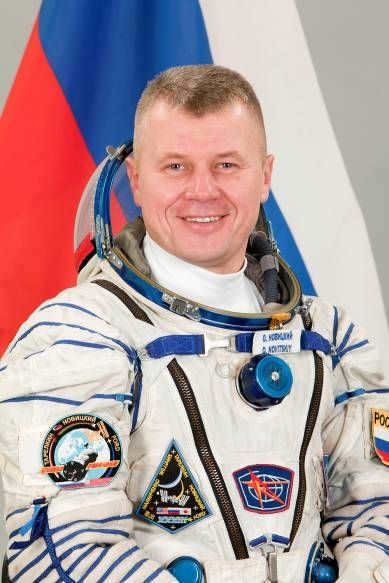
Oleg Viktorovich was born on October 12, 1971 in the town of Cherven, near Minsk. He completed his high school education in 1988 and then enrolled in the Air Force Academy in Borisoglebsk, located in the Voronezh region. In 1994, he successfully graduated from the academy and received his qualification as a “pilot-engineer”. Later that year, Oleg Viktorovich moved to Rostov-on-Don to serve as a pilot.
After completing his service in the aviation field, Oleg Novitsky underwent training at the command faculty of the Air Force Academy in Monino, Moscow region, from 2004 to 2006. During his career, he also participated in combat operations in Chechnya.
Space training
In 2006, Novitsky, who would later become a cosmonaut, made the decision to undergo a medical examination in order to qualify for further enrollment in the prestigious cosmonaut squadron. After successfully passing all the required commissions, he was officially accepted as a candidate for the cosmonaut squad. In early 2007, Oleg Viktorovich embarked on his general space training. The following year, in 2008, he participated in specialized training focused on emergency water landings of spacecraft, which took place in the city of Sevastopol.
Resources about the subject
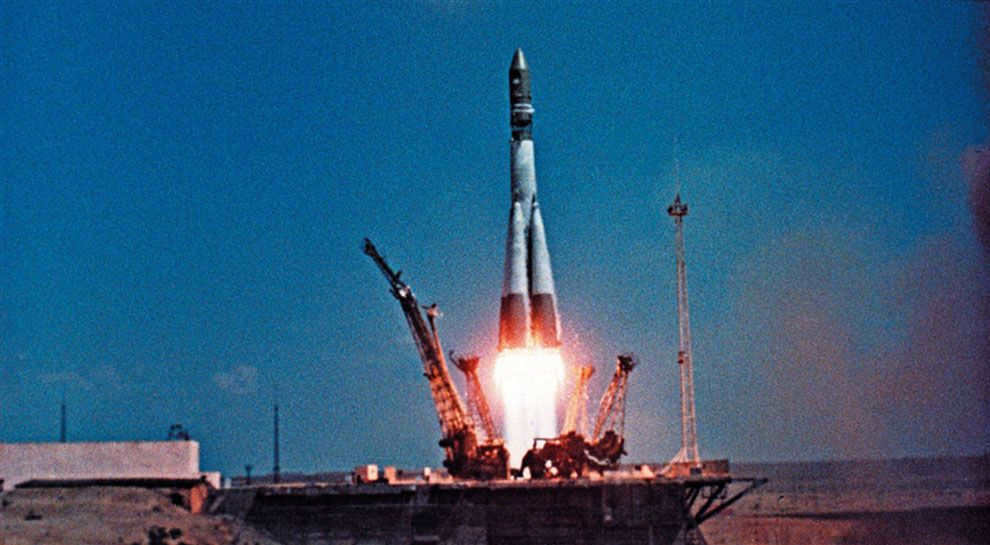
Oleg Novitsky completed his general training in June 2009 and successfully passed the required exams at the Cosmonaut Training Center. On August 1, 2009, he was appointed as a test cosmonaut.
Over the course of the next three years, Oleg Viktorovich actively participated in various activities at the cosmonaut training center. He also served as a representative of the Cosmonaut Training Center at a US space center. Oleg took part in extensive training programs, including training in the MIM (small research module), simulating the Soyuz TMA spacecraft, and the Russian segment of the International Space Station (ISS). Furthermore, he joined two other cosmonauts in survival training exercises in the desert terrain of Kazakhstan and in forested terrain near Moscow.
After completing a rigorous three-year training program, Oleg Novitsky was selected to be the commander of the Soyuz TMA-06M spacecraft and the onboard engineer for the 34th expedition to the International Space Station (ISS) in 2012.
Space Mission and Future Endeavors
In October 23, 2012, Cosmonaut Novitsky embarked on his space flight. The crew of the Soyuz TMA-06M spacecraft also included flight engineers Evgeny Tarelkin and Kevin Ford from the United States. Oleg Viktorovich spent over 140 days on board the ISS before safely returning to Earth on March 16, 2013.
The training of cosmonaut Novitsky commenced immediately. Along with fellow space mission member Evgeny Tarelkin, he took part in an experiment focused on performing a manual descent from orbit to Mars. The experiment utilized a centrifuge to simulate the gravitational forces experienced during descent. The results of the experiment revealed that the cosmonauts are capable of successfully descending to the surface of Mars following a long-duration space flight.
In February 2011, Oleg Viktorovich underwent winter survival training in a wooded and swampy area, alongside American and French cosmonauts. During the training, the team successfully constructed a tent and tepee, utilized a light-signal cartridge to mark their location, and started a fire for warmth. Additionally, medical procedures were carried out to assist a “wounded” crew member.
In 2016, astronaut Novitsky underwent a medical check-up and is currently undergoing further training for upcoming space missions.
Due to his contributions to space exploration, he was honored with the prestigious title of Hero of the Russian Federation.
Cherven.
After completing his education at A. K. Flegontov Cherven Secondary School No. 2, located in the Minsk region, he enrolled in the Borisoglebsk Higher Military Aviation School of Pilots named after V. P. Chkalov (Borisoglebsk, Voronezh region) in 1988. Due to the restructuring of the Borisoglebsk Higher Military Aviation School of Pilots, he had to continue his training at the Yeisk Higher Military Aviation School of Pilots (Yeisk, Krasnodar Territory) from 1990 to 1993. Following the reorganization of the Yeisk Higher Military Aviation Institute, he was transferred to the Kachinsk Higher Military Aviation School of the Order of Lenin, Red Banner Pilot School named after A.F. Kachin. Mr. Myasnikov (Volgograd), where he successfully graduated in 1994, specializing in “Command Tactical Fighter Aviation” with the qualification of “Flight Engineer”.
In 2004-2006, he attended the Yuri Gagarin Air Force Academy (Volgograd). During his time there, he focused on the management of military units and formations of the Air Force. He successfully completed his studies and earned the qualification of “specialist in management”.
In 2020, he graduated with distinction from the Russian Presidential Academy of National Economy and Public Administration, where he obtained a Master’s degree in State and Municipal Management.
Service in the Air Force
Between October 1994 and September 1995, he underwent training at the Borisoglebsk Aviation Training Center, which is named after V. P. Chkalov. This training took place over the course of one year.
Following his training, he served as a pilot in the instructor fighter aviation regiment of the Central Fighter Aviation Regiment, which is also named after V. P. Chkalov. This service lasted from September to December 1995.
From May 1996 to June 2004, he held various positions within the Attack Aviation Regiment (AAR) of the 1st Guards Mixed Aviation Division (MAD) of the 4th Air Army (North Caucasus Military District). These positions included pilot, senior pilot, wing commander, and deputy commander of the aviation squadron.
Upon completing his studies at the academy, he went on to serve as a squadron commander of the SHAP in the 1st Guards Mixed Aviation Division of the 4th Air Force and Air Defense Army from June 2006 to February 2007. During this time, he gained expertise in flying L-39 and Su-25 aircraft, accumulating a total flight time of 680 hours. Notably, he played a role in restoring order in the Chechen Republic and was honored with the title of “Veteran of combat operations”. Additionally, he holds the esteemed rank of 2nd class military pilot and possesses qualifications as a “Parachute and Airborne Training Instructor” and a “Diving Officer”.
In 2010, he achieved the rank of Colonel and later in the summer of 2012, he transitioned to the reserve, concluding his military service.
Education for Space[ ]
In October 2006, following a medical assessment at the Institute of Medical and Biological Problems of the Russian Academy of Sciences and subsequent review by the Interdepartmental Commission, Oleg Novitsky, aged 35, was accepted as a candidate astronaut in the astronaut team (14th intake) on February 7, 2007.
Between February 2007 and July 2009, he underwent comprehensive astronaut training at the Gagarin Astronaut Training Center, which he successfully completed by achieving excellent results on his state exams. On August 1, 2009, during a meeting of the Interdepartmental Qualification Commission (IQC), he was granted the title of test astronaut
From August 2009 to October 2010, he received specialized training as part of the International Space Station (ISS) program.
Starting in May 2012, he underwent training as a member of the ISS-33/34 primary crew, serving as the ISS flight engineer and commander of the manned Soyuz TMA-M spacecraft.
Between December 2014 and July 2020, he received training as part of the backup crew for ISS-48/49, assuming the role of commander for the Soyuz MS-02 and flight engineer for ISS-48/49.
Since July 2020, he has been receiving training as part of the primary crew for ISS-50/51, serving as the commander of the Soyuz MS-03 and flight engineer for ISS-50/51.
Service in the cosmonaut squad
The cosmonaut squad had a crew for the Soyuz MS-03 mission consisting of commander O. Novitsky (center), flight engineers T. Peske (left), and P. Whitson.
In May 2012, Oleg Novitsky served as the commander of the backup crew for the Soyuz TMA-04M spacecraft. The backup crew also included Evgeny Tarelkin and Kevin Ford (USA).
In September, the same crew was selected as the main crew for the Soyuz TMA-06M spacecraft, which launched on October 23, 2012, as part of the ISS-33 main expedition.
On July 7, 2020, Oleg Novitsky served as the commander of the backup crew during the launch of the Soyuz MS-01 spacecraft.
During the meeting of the Interdepartmental Commission at the Cosmonaut Training Center on October 26, 2020, Oleg Novitsky was included as the commander in the main crew of Soyuz MS-03, alongside Toma Pesquet (France) and Peggy Whitson (USA).
| # | Launch vehicle | Launch, UTC | Expedition | Landing ship | Landing, UTC | Flight | Spacewalks | Time in open space |
| 1 | Soyuz TMA-06M | 23.10.2012, 10:51 | Soyuz TMA-06M, ISS-33/ | Soyuz TMA-06M | 16.03.2013, 03:06 | 143 days 16 hours 15 minutes | 0 | 0 |
| 2 | Soyuz MS-03 | 17.11.2016, 20:20 | Soyuz MS-03, ISS-50/ | Soyuz MS-03 | 02.06.2017, 14:10 | 196 days 17 hours 50 minutes | 0 | 0 |
| 340 days 10 hours 05 minutes | 0 | 0 |
Biography
Education
Cherven.
Upon completing his studies at secondary school No. 2 named after A. K., he enrolled at the Borisoglebsk Higher Military Aviation School named after V. P. Chkalov (Borisoglebsk, Voronezh Region) in 1988. Due to the reorganization of the Borisoglebsk Higher Military Aviation School of Pilots, he transferred to the Yeisk Higher Military Aviation School of Pilots (Yeisk, Krasnodar Territory) from 1990 to 1993. Subsequently, he was reassigned to the Kachinsk Higher Military Aviation Order of Lenin Red Banner Pilot School named after A. F. Myasnikov (Volgograd) as a result of the reformation of the Yeysk Higher Military Aviation Institute, where he successfully completed his studies in 1994. He specialized in “Command Tactical Fighter Aviation” and obtained the qualification of “Flight Engineer”.
From 2004 to 2006, he pursued his education at Yu. YU Air Force Academy. In 2020, he successfully completed the Master’s program in State and Municipal Management at the Russian Presidential Academy of National Economy and Public Administration, graduating with honors and earning a Master’s degree.
In 2020, he graduated with distinction from the Russian Presidential Academy of National Economy and Public Administration, where he obtained a Master’s degree in State and Municipal Management.
Service in the Air Force
Between October 1994 and September 1995, he underwent retraining at the Borisoglebsk Aviation Training Center, which is named after V. P. Chkalov. During this period, he participated in a comprehensive training program at the Borisoglebsk V. P. Chkalov Aviation Training Center.
Following his retraining, he served as a pilot in the instructor fighter aviation regiment of the V. P. Chkalov Flying Training Center from September to December 1995. He played a crucial role in training and guiding other pilots during this time.
From May 1996 to June 2004, he held various positions within the 1st Guards Mixed Aviation Division (MAD) of the 4th Air Army (North Caucasus Military District). These positions included pilot, senior pilot, squadron commander, and deputy commander of an air assault squadron. His dedication and leadership made a significant impact within the division.
In 2010, I was granted the promotion to the rank of colonel. However, in the summer of 2012, my military service in the reserve came to an end.
Training for Space Exploration
In October 2006, I underwent a thorough medical examination at the Institute of Medical and Biological Problems of the Russian Academy of Sciences. Following this, I went through a review by the Interdepartmental Commission. At the age of 35, on February 7, 2007, I was accepted as a candidate cosmonaut in the cosmonaut squad (14th recruitment).
From February 2007 to July 2009, I dedicated my time to general space training at the Gagarin Cosmonaut Training Center. I successfully completed this training by passing state exams with an outstanding grade. On August 1, 2009, during a meeting of the Interdepartmental Qualification Commission (IQC), I was honored with the qualification of test cosmonaut.
He underwent training from August 2009 to October 2010 as a member of the specialization group for the International Space Station (ISS) program.
Between October 2010 and May 2012, he received training as part of the backup crew for ISS-31/32, serving as the ISS flight engineer and commander of the Soyuz TMA-M manned transport spacecraft.
Starting from May 2012, he underwent training as a member of the main crew for ISS-33/34, serving as the ISS flight engineer and commander of the Soyuz TMA-M transport manned spacecraft.
From December 2014 to July 2020, he received training as part of the backup crew for ISS-48/49, serving as the commander of the Soyuz MS-02 and flight engineer for ISS-48/49.
Since July 2020, he has been undergoing training as part of the main crew for ISS-50/51, serving as the commander of Soyuz MS-03 and flight engineer for ISS-50/51.
Service in the cosmonaut squad
Soyuz MS-03 crew: O. Novitsky (center) serving as the commander, with T. Peske (left) and P. Whitson as flight engineers.
In May 2012, Novitsky led the backup crew for the Soyuz TMA-04M spacecraft, alongside Evgeny Tarelkin and Kevin Ford (USA).
In September, the same crew was officially assigned to the main crew of the Soyuz TMA-06M spacecraft, which launched to the International Space Station on October 23, 2012 as part of the ISS-33 main expedition.
On July 7, 2020, Novitsky served as the commander of the backup crew during the launch of the Soyuz MS-01 spacecraft.
On October 26, 2020, at the meeting of the Interdepartmental Commission at the Cosmonaut Training Center, Novitsky was appointed as the commander of the main crew of Soyuz MS-03, along with Toma Pesquet (France) and Peggy Whitson (USA).
| # | Launch vehicle | Launch, UTC | Expedition | Landing ship | Landing, UTC | Flight | Spacewalks | Time in open space |
| 1 | Soyuz TMA-06M | 23.10.2012, 10:51 | Soyuz TMA-06M, ISS-33/ | Soyuz TMA-06M | 16.03.2013, 03:06 | 143 days 16 hours 15 minutes | 0 | 0 |
| 2 | Soyuz MS-03 | 17.11.2016, 20:20 | Soyuz MS-03, ISS-50/ | Soyuz MS-03 | 02.06.2017, 14:10 | 196 days 17 hours 50 minutes | 0 | 0 |
| 340 days 10 hours 05 minutes | 0 | 0 |
Yulia Novitskaya: Astronauts are and will always be unique individuals
She has mastered the art of patience. With 24 years of experience in this incredibly demanding profession, she has become an expert at waiting. Missions, work trips, dangerous locations, and eventually, a journey to the International Space Station. Despite never having been to space herself, she can speak at length about it and about the astronauts, all while openly expressing her admiration. Yulia NOVITSKAYA, a successful journalist, devoted mother, and loving wife, shares her thoughts on what it means to experience space while still on Earth.
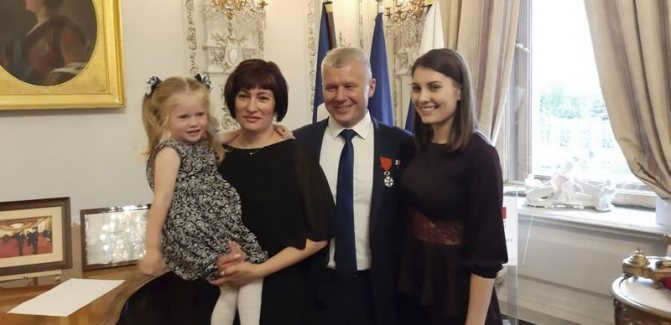
There is much less information available about Yulia Vladislavovna compared to her husband, Oleg Novitsky, who is a cosmonaut from Cherveny, Minsk region, working for Roscosmos. However, she has always been by his side, offering support during difficult times, waiting for his flights, and believing that one day his dream of going to space would come true. It is safe to say that the main accomplishments of the Novitskiy family are their daughters, Yana and Margarita. Oleg Viktorovich has spent a total of 340 days in space and on August 24, 2020, he was appointed to the backup crew for the ISS-67/68 expedition. It is expected that he will have the opportunity to visit the ISS once again in the near future. We had the chance to speak with Yulia and gain some insight into the life of a cosmonaut and their family.
– Yulia, ordinary people have held a romanticized perception of cosmonauts since the Soviet era. How does this perception align with present-day realities? Is it truly accurate?
– There is still a certain aura of romance surrounding cosmonauts even in the modern age. After all, cosmonauts were and still are exceptional individuals. Just imagine, throughout the history of Soviet and Russian manned space exploration, 122 people have ventured into space (565 worldwide, if my memory serves me right). The preparation required for each of them demands a significant amount of time and resources. It is perhaps natural that this romantic perception is gradually fading. However, the essence of the profession remains unchanged – it is our attitude that evolves. Personally, I believe that cosmonauts possess a touch of romance in their pursuit of the extraordinary and the unknown.
– Did you ever envision yourself becoming the wife of a pilot and subsequently a cosmonaut?
– I never anticipated that I would end up being the wife of an astronaut. And it was beyond anyone’s imagination that Oleg would eventually become a cosmonaut. However, as the wife of a pilot, I had a feeling it could happen. I was born in Borisoglebsk, a town with a strong military presence. My grandfather was a military pilot who lost his life during the war, and my father was a military engineer. I can’t say that I predicted my husband’s profession would also be military-related, but I could envision it. In our city, many girls from the pedagogical institute met and formed families with men from the military school. By the time I met Oleg, the school had already been disbanded, and he came to Borisoglebsk for retraining… But I always say: “I didn’t marry a pilot, I married a man.
– How did you react when your husband was chosen to be part of the cosmonaut team?
You know, I had the privilege of conducting three interviews with the esteemed Soviet cosmonaut Alexei Arkhipovich Leonov and engaging in conversations with his wife Svetlana Pavlovna. Their simplicity and genuine warmth are truly remarkable. I am incredibly grateful that my profession has afforded me the opportunity to interact with numerous first-generation cosmonauts. They are truly formidable individuals, embodying greatness. And these sentiments are not mere platitudes, but rather an honest reflection of the truth.
– What were the emotions that welled up within you when Oleg Viktorovich embarked on his inaugural space mission?
– I had an abundance of emotions stirring within me. Witnessing it live is a completely different experience from watching on a screen. Even though I had been briefed on how everything would unfold, how the ground would shake… it was still challenging to fully grasp. In that moment, a sense of joy and fulfillment washed over me as my dream was coming true. I felt an overwhelming sense of pride. The sheer brilliance of the human mind astounds me. The brilliant minds of scientists and designers were able to create a rocket capable of journeying into space! It’s truly mind-boggling. Standing by me during Oleg’s launch was Irina Rogova, the press secretary of the Cosmonaut Training Center. If my memory serves me right, this was the twelfth crew she had seen off into space. With each cosmonaut, she carried the same level of concern as if they were her own. For me, witnessing my husband’s launch was a whirlwind of emotions. However, conveying the magnitude of what occurred in words is incredibly challenging, even for someone like me who works as a journalist.
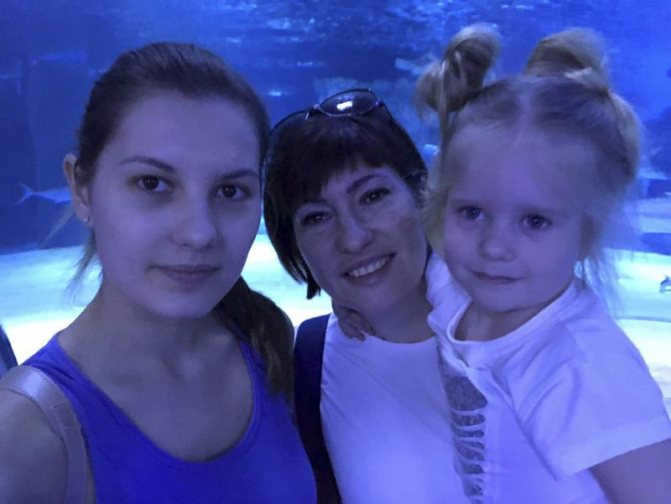
– Have you witnessed the launch of other astronaut crews?
– I have not been physically present for other launches at Baikonur. However, I always make sure to watch all launches on TV or through live streams on the internet. Even if I am unable to watch the entire launch due to work or other circumstances, I always make sure to catch the ending later on in the recording. After that, I reach out to the astronaut’s wife to congratulate and support her.
– Throughout Oleg Viktorovich’s two space flights, you maintained a blog, which later served as the foundation for the book “Oleg Novitsky. Voice of the heart. Diary of a cosmonaut’s wife”. How did you come up with the idea for the blog?
– The idea was not mine. It was Roscosmos correspondent Natalia Burtseva who approached us with a proposal to film a story. During our conversation, she discovered that I have a background in philology and suggested that I start a blog while Oleg is in space. It is common for many cosmonauts to write books and keep diaries, and a female perspective on space exploration is particularly intriguing.
I agreed. Thus, the initial segment of “Diary of a cosmonaut’s spouse. Voice of the heart” emerged. Subsequently, I was presented with the opportunity to publish the book in Belarus. When my husband embarked on his second space voyage, I initially hesitated about whether to write again or not, uncertain if I would possess adequate material for another diary. However, it transpired that there was still an abundance of topics to explore. Presently, with the knowledge that Oleg will likely embark on his third mission, I have a compelling notion of additional subjects to write about, which I had not previously had the opportunity to recount. I have a precise plan for how to commence the first chapter.
– Recently, Oleg Viktorovich was appointed as the commander of the backup crew. This entails an extensive training regimen and a lengthy period of preparation ahead. How do you and your daughters cope with his prolonged absence?
Recently, Oleg embarked on a five-week business journey to the United States of America. Naturally, his daughters, Rita and Yana, miss him greatly, as do I, although I have become accustomed to this kind of lifestyle to some extent over the years. Nowadays, there are numerous ways to stay connected; we can easily send each other photos and videos, making it more convenient. During Oleg’s time in space, our communication method was quite similar, except that we utilized video calls less frequently.
– How do you typically celebrate the arrival of the New Year, and what are your expectations for 2020?
– My family has a special tradition of attending the New Year’s Eve show of the Zapashny brothers, whom we are friends with. It’s an amazing event that we all look forward to every year. It’s during this time that Rita, my daughter, starts to realize the existence of Santa Claus and the joy of receiving presents. This celebration brings out the child in all of us and fills our hearts with anticipation for miracles and fairy tales.
As the New Year approaches, I wish for everyone to have good health, not just in my family, but all around the world. Because with good health comes happiness and the ability to enjoy life to the fullest.
Elena KUKHAREVA, 1st year student of the BSU Journalism Department
Photo from the family archive of Oleg and Yulia Novitskikh.
Materials organized by subject
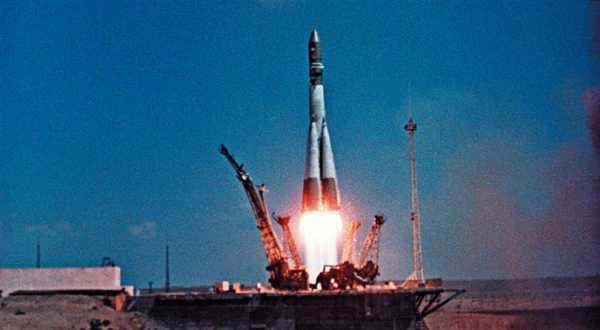
Oleg Novitsky successfully completes his general training in June 2009 and successfully passes all the required exams at the Cosmonaut Training Center. On August 1, 2009, he is appointed as a test cosmonaut.
Over the next three years, Oleg Viktorovich actively participates in various activities at the cosmonaut training center. At one point, he serves as a representative of the CPC at a US space center. He also takes part in training sessions related to the MIM (small research module), the simulator model of the Soyuz TMA spacecraft, and the Russian segment of the ISS. Furthermore, he joins two other cosmonauts in survival training exercises in the desert terrain in Kazakhstan, as well as in a wooded area near Moscow.
Have you already read about: Cosmonaut Beregovoy Georgy Timofeevich
Mother of the Belarusian astronaut: Until the very last day my husband and I had no idea about our son’s plans.
A tidy house at the very end of Barykin Street in the town center of Cherven. Behind the fence, there is a beautiful flower garden. Valentina Novitskaya, the correspondent of “Respublika,” enters the house where the future astronaut spent her childhood and youth.
Two centimeters away from perfection
– Oleg’s room has always been a hallway. Everything here has remained the same, except his desk, which has been replaced by a book table. This is where we all gather when the children and grandchildren come,” Valentina says.
We are sitting in the kitchen, surrounded by family albums, reminiscing about the past.
– I have vivid memories of the year when Gagarin made his historic space flight. I was just 11 years old at the time. Our house had a television set, and all the programs were dedicated to this momentous event. Everyone was filled with anxiety and anticipation. I can still recall my mother pacing around the house, tearfully asking, “How is he, poor thing?” Meanwhile, my father grumbled, “What on earth possessed him to go up there!” Valentina Novitskaya and I often laugh about it now. But when Gagarin successfully landed, the joy was boundless. Schools held solemn ceremonies, people took to the streets, beaming with happiness, and congratulated one another… It’s only now, 51 years later, that I truly understand the emotions Yuri Alekseevich’s mother must have felt before his flight.
When Oleg was born, Valentina and Victor were living in a rented apartment in Cherven. Eventually, they were offered an unfinished house, and the family relocated to Barykin Street. It was here that Dmitry and Marina were born.
– It was a challenging period. We had three children, and it was not always easy to provide them with clothes, let alone new toys. I have a vivid memory of Oleg, who was still a student at the time, approaching me and saying: “Don’t worry, mommy, when I grow up, I will become a pilot and drop a chest full of money from the sky for you. It will be enough for everything,” recalls Valentina Novitskaya. – I still wonder where my son developed his passion for aviation. There are no military personnel in our family: I am a seamstress by profession, and my husband works as a driver. Perhaps the influence came from my cousin Igor, who was older than Oleg and enrolled in a flight school right after finishing high school. However, my husband and I remained completely unaware of our son’s aspirations until the very last day.
Throughout his 10 years of education, Oleg’s parents were never summoned to the school. With a calm and balanced demeanor, Oleg held himself to a high standard and was regarded as one of the top students. Additionally, he had a strong passion for soccer and actively participated in matches for both the city and the district. Thus, it came as no surprise to his parents when Oleg ventured off to Minsk for yet another competition.
– It was only upon his return that he admitted to us that he had successfully cleared the regional medical commission, and prior to that, the district one. He had a smile on his face as he proclaimed, “Mom, I’m going to soar through the skies.” It was then that I understood why he had been so dedicated to studying physics and mathematics in recent years. It also explained why he had constructed a makeshift bar near our house, wedged between the supports of a power pole. The selection process for flight school was incredibly rigorous: impeccable health and education were non-negotiables, and an exact height of 178 cm was required. So, in order to meet this requirement, he diligently worked on his upper body strength during his 9th and 10th grade years, as evident in the black-and-white amateur photo.
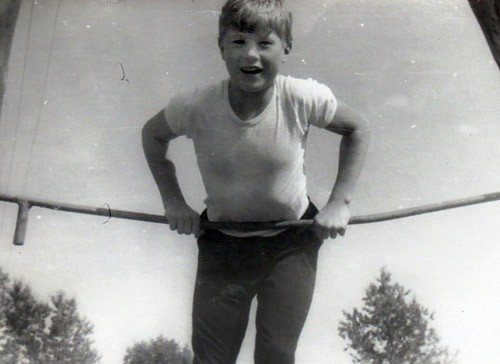
– Oleg successfully completed his final exam in Belarusian language and literature at school on June 23. Shortly after, we were unable to attend the graduation party. On the night of the 24th, I sent him and his father to Borisoglebsk. He only brought his certificate and enrollment certificate with him, as everything else would be provided by the flight school.
"A friend took care of Oleg’s application to become an astronaut."
Valentina still holds onto her son’s school letters. They are now kept in a desk drawer, tied together with a blue ribbon. One of the early letters from Oleg recounts his experience in the young fighter course. Alongside the text, a photo of a young man in a cap provides Valentina with even more information. The letter also mentions Oleg’s first flight, during which the instructor presented him with a pack of cigarettes, a traditional gesture for beginner pilots. Other memorable moments include Oleg’s first parachute jump and his first award. These four years have flown by for Valentina, feeling as if it were only a single day.
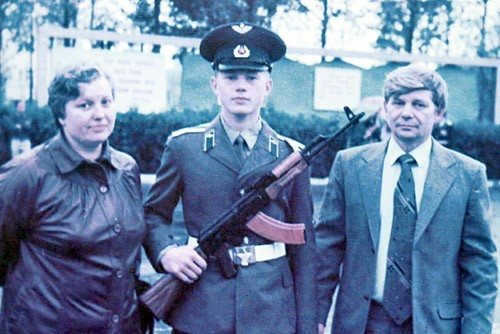
Back in 1995, a splendid ceremony took place in Cherven, where Julia became the first and sole young woman to enter her father’s abode.
– At that time, I had limited opportunities to commit to memory the fresh locations where he pursued his studies and served, as well as the novel addresses from which correspondence arrived. Volgograd, Borisoglebsk, Budennovsk, Monino in the vicinity of Moscow… My son never boasts about his recent positions and appointments: my father and I are consistently the last to be informed of any updates. For instance, we were unaware that he actively participated in combat operations in Chechnya and received commendations. Moreover, he independently gained admission to the prestigious Air Force Academy bearing the name of Yuri Gagarin. Gagarin, a name he had aspired to for quite some time. Even his enrollment in the cosmonaut squadron was casually mentioned. Just as he completed his studies at the academy and visited us, his mobile phone rang. Subsequently, he announced, “I shall embark on a journey to space.” We all laughed then, and later I discovered that a friend had applied on his behalf – and Oleg was accepted. That is how they transitioned from Budennovsk to Star City,” reminisces Valentina Novitskaya. – I vividly recall the day when my spouse returned home from work, tossed a newspaper onto the table in a state of agitation, and exclaimed, “Read this!” There, a photograph of Oleg accompanied an article stating that he had attained the designation of “test cosmonaut” and was undergoing training as a spacecraft commander. My husband and I retreated to the kitchen and wept throughout the evening… We chose not to divulge this information to anyone, yet the entire town was aware of the news the following day. Through newspaper articles, we grasped the details of their training in zero gravity and on the centrifuge, the practice of docking, and acquiring survival skills in extreme conditions post-landing. All of this seemed like an incomprehensible language, something remote and unfamiliar. It was only after visiting Star City that I finally comprehended the veracity: indeed, my son will venture into space for a duration of 156 days.
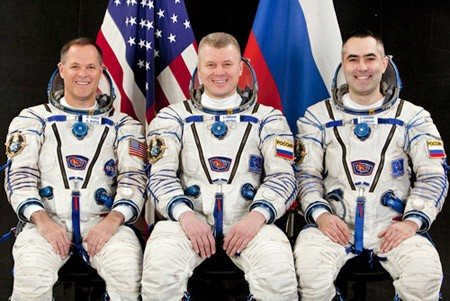
“Don’t worry, mom, everything will be fine.”
Oleg’s father, Victor, passed away two years ago. The mother was deeply concerned that this tragic event, which had a significant impact on the entire family, would not hinder her son’s preparation. Their relationship was incredibly strong.
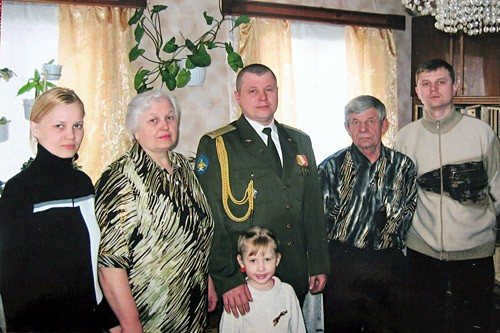
– During his time studying in the United States, he received news that compelled him to abandon everything and return home. However, the immense distance would have made it impossible for him to make it back in time. It was an arduous task for me, Dima, and Marina to convince him otherwise. Later, my daughter-in-law informed me that he had discovered an Orthodox church there and began visiting daily to pray for the peaceful repose of his father’s soul, – reminisces Valentina Novitskaya.
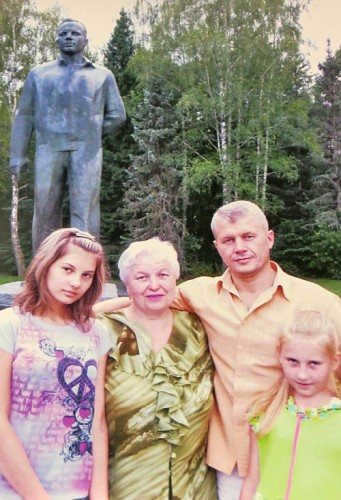
– Oleg and his family arrived a month ago. I continuously inquired: “How is everything, my son? I struggle to sleep at night, as I am deeply concerned for you”. He calmly reassured me: “I am doing well, mom, please don’t worry. Worries only bring negative energy.” He continues to diligently work on the household tasks – repairing the fence, organizing the barn, and tending to the firewood. Meanwhile, I am preparing dinner in the kitchen, but my vision is blurred by tears. I fervently pray to God for his safety and well-being.
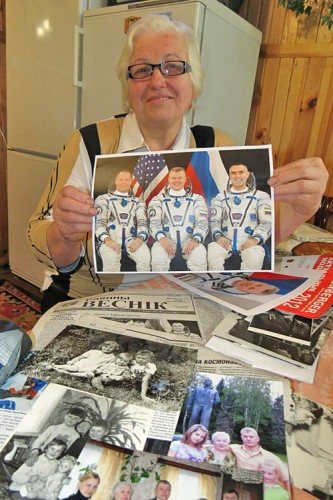
– I possess an image of him in the headboard of my bed – dressed in a spacesuit, grinning. In this depiction, he appears as a genuine astronaut, a strong and dependable individual, much like the portrayals in films. And recently, I had the realization that I am starting to remember him more frequently as a child. This feeling was particularly strong when my husband and I, accompanied by our son, embarked on a tour to Leningrad. It happened to be during the white nights, and Oleg stayed out late with his father. When they returned, Olezhka excitedly exclaimed to me, “Mom, can you believe it: the bridges opened up, and the river flowed beneath them!” I sincerely hope that he will experience the same sense of wonder when he gazes upon our planet from that extraordinary vantage point, a perspective unknown to most inhabitants of Earth.
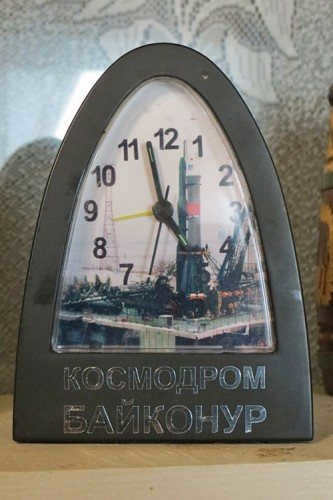
It’s official. In early March, Russian cosmonauts Oleg Novitsky and Evgeny Tarelkin successfully completed their training on the simulator for the Russian segment of the International Space Station (ISS) at the Cosmonaut Training Center. Joining them on the ISS-33/34 crew is NASA astronaut Kevin Ford. The Soyuz TMA-06M spacecraft, carrying the crew for the new expedition, was launched from the Baikonur Cosmodrome on October 23 and autonomously docked with the ISS. The cosmonauts are set to spend 156 days in orbit.
